Posts Tagged ‘attorney’
Homeowners Insurance Tips After Hurricane Sandy
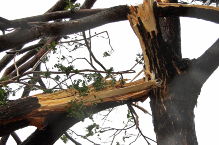 In the aftermath of Hurricane Sandy, many people are assessing damage to their homes, cars and property. Insurance losses across the country are already estimated at $7 billion to $15 billion, while total losses will easily exceed $50 billion. If you are affected, it is important to act promptly. If you made it through the storm with property intact, now is a good time to plan for future hurricanes.
In the aftermath of Hurricane Sandy, many people are assessing damage to their homes, cars and property. Insurance losses across the country are already estimated at $7 billion to $15 billion, while total losses will easily exceed $50 billion. If you are affected, it is important to act promptly. If you made it through the storm with property intact, now is a good time to plan for future hurricanes.
The lawyers at Breakstone, White & Gluck offer these tips:
Contact your insurance company. If you suffered damage, immediately contact your insurance company. Call your agent, or call the company directly. Let them know what damage you suffered, and ask them to send claims forms. If the damage is extensive, you may find it useful to hire a public adjuster to catalog and estimate your damages.
File the claim. Obtain as much supporting information as you can, such as receipts and photographs if you have one. If you did an inventory of your home, that will be useful proof.
Cooperate with the adjusters. A field adjuster will visit your property to assess the damage to your home or your vehicles. Provide any additional information they need.
Understand your insurance policy.Nobody likes reading insurance policies (well, we know a few lawyers who enjoy that, but nobody else), but the policy will spell out the steps you must take during the claims process. Follow those steps to protect your rights in the event of a dispute of the money you are owed. Failure to cooperate or to follow claims procedures may lead to a denial of your claim.
Tree damage may be covered. Standard homeowners insurance policies cover damage if a tree falls on your home or a garage, shed or fence on your property. If it hits a neighbor’s property, then their policy or yours may cover it. If it just lands in your yard, it is likely that you will have to bear the entire cost of its removal.
Beware of Short Statute of Limitations. Contract claims in Massachusetts generally have a six-year statute of limitations. But it is likely that your insurance policy has provisions governing disputes that are much shorter, often just months after the insurance company makes its tender of settlement. If there is a dispute, get legal help quickly!
Make Sure You Are Protected for the Next Big Storm
Inventory your property. Filing a claim is easier if you know what you own and have documented it, including writing a list and taking pictures or a video. Keep a back-up copy of everything in a safe place away from the house. For help, the Insurance Information Institute has online software you can find at www.knowyourstuff.org.
Understand your policy. Have your agent or broker explain key provisions, exclusions, and other options. For liability insurance, consider adding an umbrella. For property damage, consider earthquake insurance.
Know your insurance policy’s hurricane deductible. Massachusetts is one of 18 states which allows homeowners insurance companies to set a specific deductible for hurricane damage.
Consider flood insurance. Flood-related losses are only covered if you have flood insurance. Standard homeowners and renter policies cover damage from wind and wind-driven rain that enters a home. But damage from water on the ground or seeping into a basement is not covered. This will be the main reason many victims of Hurricane Sandy will not have insurance coverage.
In fact, only about 20 percent of homeowners who should have flood insurance actually have the coverage, according to the Insurance Information Institute. Meanwhile the average residential flood results in $30,000 in damage, according to the National Flood Insurance Program. Consumers can learn more at www.floodsmart.gov.
Car Insurance. If you have a comprehensive auto insurance policy, flood damage to your car should be covered. But motorists carrying only liability coverage will not be covered.
Please explore some of our other articles on insurance basics. The policies you have protect you from claims, cover your property losses, and in many cases pay you for damages caused by others who may be underinsured. Usually it is worth the extra cost to have that peace of mind.
Understanding and Buying Massachusetts Car Accident Insurance
What Every Massachusetts Bicyclist Needs to Know About Car Insurance
Read More
Meningitis Outbreak: Over 300 Now Infected, 23 Dead as State Calls for Licenses
State officials have announced they will seek permanent surrender of New England Compounding Center’s (NECC) pharmacy license in the wake of a fungal meningitis outbreak which has infected more than 300 people and left 23 dead.
At a Tuesday press conference, state officials announced they will seek the pharmacy’s license and permanent license revocation for NECC’s three pharmacists. Recent state inspections of the closed-down Framingham facility found dirty and defective equipment and showed the company had failed to follow its own safety tests and properly sterilize tools.
Governor Deval Patrick said a federal criminal investigation has been launched, while Madeleine Biondolillo, director of the state Bureau of Health Care Safety and Quality, said the company had been violating its state compounding license. The facility was licensed to produce medicine with a patient-specific prescription in hand, not manufacture large shipments.
As of this week, 304 people had contracted fungal meningitis or joint infections linked to the injectable steroid produced by NECC, reported The Boston Globe. Testing has found the fungus matches a type found in unopened vials of the steroid shipped from NECC, though they are still investigating how the fungus got into the vials. The injectable steroid is methylprednisolone acetate.
The 23 deaths linked to the defective steroid come from seven states. No one has been reported ill in Massachusetts. But federal officials say as many as 14,000 people may have been exposed to the contaminated drug between May 21 and Sept. 26, when it was recalled. The company went onto recall all its drugs.
The Food and Drug Administration released a list this week of more than 3,000 NECC customers who received products other than the injectable steroid blamed for the meningitis outbreak. They included 215 Massachusetts doctors, health centers and hospitals. The shipments fell within the time frame of when the defective steroids were produced at the facility.
Ameridose, a Westborough pharmacy with the same owners as NECC, has also been closed down since Oct. 10 in an agreement with state officials. It is scheduled to remain closed until Nov. 5 for state inspections.
Related:
- CDC: 10 more people have fungal infections linked to Framingham pharmacy, The Boston Globe.
- New England Compounding did not follow sterility procedures, investigators find; state orders regular inspections of similar pharmacies, The Boston Globe.
- Corrected list of New England Compounding customers includes 215 in Massachusetts, The Boston Globe.
Recalled Bicycles Have Defective Fork
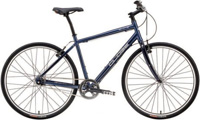 A bicycle distributor has recalled about 12,000 high-end bicycles because the front forks can break, posing a fall and injury hazard.
A bicycle distributor has recalled about 12,000 high-end bicycles because the front forks can break, posing a fall and injury hazard.
Specialized Bicycle Components, Inc. of Morgan Hill, California has recalled the bikes in cooperation with the Consumer Product Safety Commission (CPSC). The recalled bikes were manufactured by Kinesis of China. Specialized has received four reports of the front forks breaking. The front fork is the part of a bike which holds the front wheel up and allows the rider to steer. The four reports involved facial fractures, head and shoulder injuries and cuts.
The product recall spans a number of 2008 and 2009 men’s and women’s Global model bicycles. The models come in multiple colors and were sold nationwide at authorized Specialized retailers from July 2007 to July 2012. They sold for between $550 and $1,100. The recalled bikes include:
- Globe Elite
- Gloe Sport
- Globe Sport Disc
- Globe Centrum Comp
- Globe Centrum Elite
- Globe City 6
- Globe Vienna 3
- Globe Vienna 3 Disc
- Globe Vienna 4
- Globe Vienna Deluxe 3
- Globe Vienna Deluxe 4
- Globe Vienna Deluxe 5
- Globe Vienna Deluxe 6
Consumers are advised to immediately stop using the defective bikes and return them to an authorized Specialized retailer for a free installation of a free replacement fork.
Related:
- Specialized Bicycle Components Recalls Bicycles Due to Fall and Injury Hazards, CPSC.
Pedestrian Accidents Surge in September
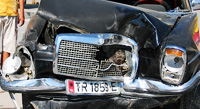 Two car accidents killed pedestrians this weekend in Lowell and Townsend, the latest in a series of injuries and deaths in the past month.
Two car accidents killed pedestrians this weekend in Lowell and Townsend, the latest in a series of injuries and deaths in the past month.
A 50-year-old Lowell man walking on West Sixth Street was killed early Sunday morning in a hit-and-run pedestrian accident. The previous day, a 57-year-old Townsend man was killed on Wallace Hill Road in that community. On Sept. 9, a 38-year-old man walking with his girlfriend’s young daughter was killed when he was struck by a Dodge Ram pick-up truck in Whitman. The 4-year-old was also hit and survived with serious injuries.
In the past month, pedestrians have also suffered serious injuries in car collisions in Northborough, Salem and Woburn.
When a pedestrian accident occurs, police often respond by increasing traffic monitoring as a signal to drivers that they are watching. When drivers take that message and pedestrians follow the rules of the road, the roads become safer for everyone. The attorneys at Breakstone, White & Gluck of Boston have over 85 years of combined experience handling car accident and pedestrian accident cases. We offer you these tips to stay safe on the road:
Tips for Pedestrians
Sidewalks. Use sidewalks as much as possible.
Understand the law. You have the most protection in crosswalks and intersections with “Walk” signals. Use these as much as possible.
Be patient. Resist the urge to cross the street before a “Walk” signal lights.
Pay attention. Do not talk on your cell phone or text while waiting to cross the street or when walking through traffic.
Wear bright colors. When walking or running at night or in the early morning, consider wearing a neon vest and carrying a flashlight.
Time of day. Be aware of when pedestrian accidents often occur. On weekdays, they are most likely to occur between 4 p.m. and midnight, according to the National Highway Traffic Safety Administration (NHTSA). On weekends, the majority occur between 4 p.m. and 4 a.m.
Shopping areas. Pedestrian accidents can happen in parking lots at shopping areas and schools as well as on streets. Walk slowly and watch for cars pulling out of spaces.
Eye contact. When you are uncertain about what a driver is planning, attempt to make eye contact.
Tips for Drivers
Crosswalks. Pedestrian have the right of way. They have the most protection in crosswalks and intersections with “Walk” signals and green lights. You must stop before the crosswalk and not on it, even if no one is crossing it.
Slow down. Slowing your speed and looking out for pedestrians and bicyclists are the best way to avoid a car accident.
No texting while driving. This is against the law in Massachusetts and reduces your ability to react to other drivers, bicyclists and pedestrians.
Avoid other distractions. Limit distractions, such as talking on your cell phone, grooming and extensive use of the GPS and maps.
Change your travel route. Ask yourself if you can change your travel plans to reduce encounters with pedestrians. Maybe you can avoid school zones when classes are in session or dark roads when runners and walkers may be traveling.
School zones and buses. Drive slowly. In Massachusetts, the speed limit for school zones is 20 miles per hour. Remember you are required to stay 100 feet behind a stopped bus and cars are not allowed to pass other cars stopped for a school bus.
Read More
Child Passenger Safety Week: a Reminder Car Seats are Critical to Protecting Children
If you have children, your car probably has at least one car seat buckled in at all times. But when was the last time you checked its positioning or if your child is using the right model?
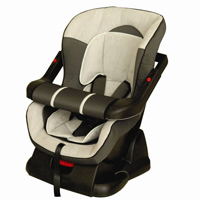
A good answer is right now. The National Highway Traffic Safety Administration (NHTSA) is observing Child Passenger Safety Week from Sept. 16 – 22. Sept. 22 is National Seat Check Saturday. Parents can click here and find a full list of sites throughout Massachusetts offering free car seat checks by certified and trained professionals.
The right car seat and positioning is critical because motor vehicle crashes are one of the leading causes of death among children ages 3 to 14. A car accident can come suddenly without warning and a child passenger safety seat is essential to keeping young passengers safe.
Child passenger seats are generally divided into four categories: infant carrier seats, rear-facing seats, forward-facing seats and booster seats.
All 50 states and the District of Columbia require child safety seats and all but two – Florida and South Dakota – require booster seats or similar devices for children who have outgrown safety seats.
The Massachusetts Child Passenger Safety Law requires all children riding in passenger motor vehicles be in a federally-approved child passenger restraint which is properly fastened and secured until they are 8 years old or over 57 inches tall. The number of children increased substantially with the passage of the Booster Seat Bill in 2008.
About Child Passenger Seats
Infant carrier seat. These are for children up to 1 year of age who weigh 20 pounds. The height limit is up to 26 pounds.
Rear-facing convertible seat. These are for children who are 6 months to 1+ year of age, who weigh under 30 pounds.
Forward-facing seat. These are for children over 1 year of age who weigh more than 20 pounds and under 40 pounds.
Booster seat. These are for children age 4 to 8. When students turn 8 and stand taller than 4 feet 9 inches, they can transition to a back seat belt. It is recommended children travel in the backseat wearing a seatbelt up until the age of 13.
Related:
- Enhanced Child Passenger Safety Law, Commonwealth of Massachusetts.
- State Child Passenger Safety Laws, Governors Highway Safety Association.
Defective Blind Xpress Window Blinds Recalled
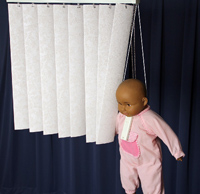 The case of a young Michigan girl strangled to death in a vertical blind has prompted the recall of about 139,000 custom-made vertical window blinds and 315,000 horizontal products.
The case of a young Michigan girl strangled to death in a vertical blind has prompted the recall of about 139,000 custom-made vertical window blinds and 315,000 horizontal products.
The Consumer Product Safety Commission (CPSC), in cooperation with Blind Xpress of Livonia, Michigan, announced the recall on September 6. The two-year-old girl from Commerce Township was reportedly strangled in the hanging loop of a Blind Xpress vertical blind cord in 2009.
The CPSC is recalling the defective window blinds because the design makes it easy for children to become entangled in the cord loop. Part of the problem is the custom vertical blind cords do not have a cord-tensioning device that attaches to the wall or floor. The horizontal blinds do not have inner cord stop devices.
The recall involves Blind Xpress blinds sold in specialty stores in Michigan, Ohio and Indiana from January 1995 through December 2011. The defective blinds were manufactured in the United States.
The CPSC urges consumers to immediately stop using the window blinds and contact the Window Covering Safety Council for a free repair kit. The toll-free number is 800-506-4636.
According to CPSC data, were 147 incidents involving children being injured or killed from 2004 to 2010 – or 21 per year.
The CPSC, industry and safety groups have made several efforts over the past couple decades, including recall/retrofit programs. The major push came in 2009, when after the death of 16 children, the industry recalled 55 million Roman Shades with exposed inner cords on the back of the shades.
The Parents for Windows Blind Safety, a non-profit organization which advocates for more stringent regulations, says the hazard lies with cords which stretch more than 7 1/4 inches. It proposes the window blind industry sell cordless blinds or those with inaccessible cords.
Related:
- Death of Child Prompts Recall of Window Blinds by Blind Xpress, Consumer Product Safety Commission.
- The History of Corded Window Covering Recalls, Parents for Window Blind Safety.
DePuy Hip Implant Cases Settled for $600,000
Johnson & Johnson has agreed to pay about $600,000 to resolve three product liability cases involving its DePuy hip implants, which were recalled in 2010 after hundreds of patient complaints and a study emerged revealing a substantial device failure rate.
The New Jersey-based company settled the cases of three women who had filed claims in a Las Vegas court. All three women had required a second hip revision surgery to treat and correct their pain. Each will receive about $200,000. The cases had been scheduled for trial Dec. 3.
The next three lawsuits involving defective DePuy hip implants are set for January in a Maryland state court.
In August 2010, Johnson & Johnson’s DePuy unit recalled 93,000 of its ASR hip implants globally and 37,000 in the United States. The recall was announced alongside results of a study from a UK joint replacement registry, which showed 12 percent of patients required a second revision surgery within five years. The Food and Drug Administration (FDA) also reported it had received about 400 complaints from patients in the two years prior.
Since the DePuy hip recall, more than 8,000 patients across the country have filed lawsuits against the medical device maker, alleging the ASR hips are defective. About 6,000 of these have filed in federal court.
Patients claim the DePuy metal-on-metal hip implants are defective, saying they caused friction between the metallic ball and socket components. The recalled DePuy hip implant can wear down and produce metallic particles in patients’ bloodstreams, along with pain, joint dislocations, infections and bone fractures.
Johnson & Johnson said it has spent about $800 million on the hip implant recall.
Related:
- J&J said to pay $600,000 to settle first suits over hips, Bloomberg Business Week.
- DePuy hip implant recall leads insurers to seek recovery, Massachusetts Injury Lawyer Blog.
Defective Drug Warning: Reumofan Diet Supplements
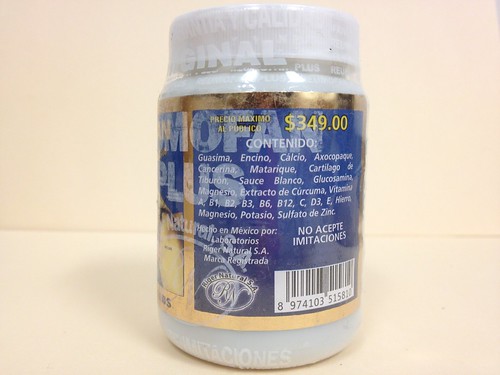 Those who take so-called “natural dietary supplements” want to listen to the Food and Drug Administration’s (FDA) latest alert on Reumofan Plus and Reumofan Plus Premium, which have now been linked to cases of death and stroke.
Those who take so-called “natural dietary supplements” want to listen to the Food and Drug Administration’s (FDA) latest alert on Reumofan Plus and Reumofan Plus Premium, which have now been linked to cases of death and stroke.
“Consumers who are currently taking Reumofan Plus or Reumofan Plus Premium, or who have recently stopped taking it, should immediately consult a health care professional,” said Elizabeth Miller, Pharm.D., acting director of FDA’s Division of Non-Prescription Drugs and Health Fraud.
The FDA issued its first alert on the dangers of Reumofan Plus on June 1, stating the drug had several active pharmaceutical ingredients not listed on the label. This week, the agency issued an updated alert for both the drug and Reumofan Plus Premium, saying it had since received reports of death, stroke and these symptoms:
- Severe bleeding in the gastrointestinal tract
- Dizziness
- Insomnia
- High blood sugar levels
- Problems with liver and kidney functions
- Corticosteroid withdrawal syndrome
These defective products are marketed as natural dietary supplements which treat arthritis, muscle pain, osteoporosis and bone cancer. If not properly supervised by a medical professional, those who stop taking the supplements can face serious withdrawal symptoms.
The defective drugs may contain corticosteroids and abrupt discontinuation can supress the adrenal glands, which regulate a number of hormone and body functions. Users could experience fatigue, low blood sugar levels, fainting and other symptoms.
The Reumofan products are manufactured in Mexico by Riger Naturals and sold on the Internet, flea markets and some retail outlets. The Mexican Ministry of Health has also issued a health warning to its citizens and ordered Riger Naturals to recall the products.
FDA testing of Reumofan Plus and Reumofan Plus Premium show they contain two ingredients which require prescriptions: diclofenac sodium and methocarbamol. Reumofan Plus also contained dexamethason, a type of corticosteroid.
The FDA offers consumers these tips for avoiding defective and dangerous drugs:
- Be wary of off-the-counter products which only have prescription counterparts.
- Be cautious when a label has a foreign language.
- Be aware that so-called “natural dietary supplements” are not subject to the same FDA pre-market review as prescription drugs and some over-the-counter drugs.
Related:
- Reumofan Products Pose Risk to Consumers, Food and Drug Administration.
- Dietary Supplements, Food and Drug Administration.
Recalled Heart Device and Similar Model Under FDA Watch
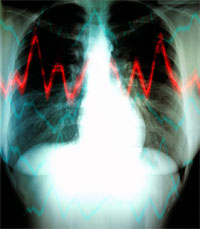 The Food and Drug Administration (FDA) has ordered St. Jude’s Medical to expand studies into Durata defibrillator leads, saying the heart devices are sufficiently similar to Riata leads, which were recalled last year. The agency is also seeking new data on Riata.
The Food and Drug Administration (FDA) has ordered St. Jude’s Medical to expand studies into Durata defibrillator leads, saying the heart devices are sufficiently similar to Riata leads, which were recalled last year. The agency is also seeking new data on Riata.
Defibrillators are implanted in patients with abnormal heart rhythms to regulate the heart beat. The medical devices are connected to the heart with leads. Riata was recalled because in some cases, wires were breaking through the insulation, which can potentially lead to a life-threatening abnormal heart rhythm.
A recent St. Jude study of 700 Riata patients found the defective wire broke through the insulation in about 19 percent of cases. A study led by a Minneapolis Heart Institute cardiologist has linked Riata leads to 20 deaths.
St. Jude, of St. Paul, Minnesota, pulled the defective Riata leads off the market in December 2010 and the FDA issued a medical device recall in late 2011. A 2011 count found 79,000 patients were still implanted with the Riata leads.
Responding to the FDA order, St. Jude said it is already collecting data on both Riata and Durata. The company stated the medical devices are different in design and a new coating meant to protect the insulation.
The FDA’s orders include routine X-rays for patients enrolled in post-market Durata studies to identify any insulation problems. St. Jude must also perform X-rays in a three-year post-market study on the defective Riata leads. The goal is to detect extruded leads which are floating loose in the heart.
Surgery to remove extruded leads can be dangerous. St. Jude says many patients live with the loose wires and continue to function normally. The FDA has advised doctors to closely monitor patients.
Related:
- FDA Orders Review of Heart Devices, The Wall Street Journal.
- Riata patients should get X-rays, FDA says, Star Tribune.
- Doctors grapple with FDA advice for troubled heart wire, Fox News.com.
Defective Dehumidifiers Recalled by Sears and Kmart
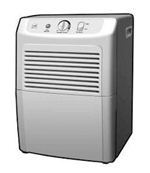 Sears, Roebuck and Co. and Kmart Corp. have issued a large product recall for dehumidifiers which can overheat, smoke, melt and catch on fire.
Sears, Roebuck and Co. and Kmart Corp. have issued a large product recall for dehumidifiers which can overheat, smoke, melt and catch on fire.
The voluntary recall, issued in cooperation with the Consumer Product Safety Commission (CPSC), is for 795,000 Kenmore Dehumidifiers. The devices were manufactured by LG Electronics (TIanjin) Appliance Co. Ltd., of Tianjin, China.
There have been 107 reports of incidents involving injury, including three cases of smoke inhalation. The humidifiers have caused more than $7 million in property damage.
The product recall covers 35-, 50- and 70-pint dehumidifiers which were manufactured between 2003 and 2005. They were sold at Sears and Kmart stores nationwide as well as the stores’ websites from 2003 to 2009 for between $140 and $220.
If you suspect you have a defective device, click the link below to see if your product model number is on the list and how to contact the store. Consumers who own a defective device are advised to immediately stop using it and unplug it. They will be compensated with a gift card which can be used at Sears or Kmart, as well as with a $25 coupon to purchase a new device at Sears.
LG Electronics Tianjin Appliance Co. issued another dehumidifier recall in 2009 and again in 2011 for 98,000 units. The Goldstar and Comfort-Aire dehumidifiers had a power connector which could short circuit, posing a fire risk. The company issued that recall after receiving 11 reports of property damage totaling more than $1 million. A Hudson, Mass. sustained $183,000 in damage from one of the defective dehumidifiers.
Those dehumidifiers were sold at The Home Depot, Walmart and Heat Controller Inc. nationwide from January 2007 and June 2008. In that case, consumers were advised to stop using the defective products and contact LG to arrange a free repair at an authorized service center.
Related:
Sears Recalls Kenmore Dehumidifiers Due to Fire and Burn Hazards, Consumer Product Safety Commission.
Dehumidifiers Recalled by LG Electronics Tianjin Appliance Due to Fire and Burn Hazards, Consumer Product Safety Commission.
Consumer Product Safety Commission.
Product Liability, Breakstone, White & Gluck.
Read More

